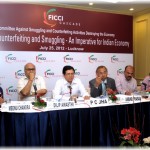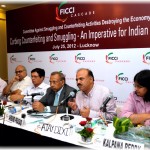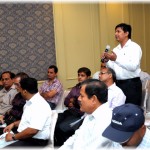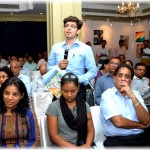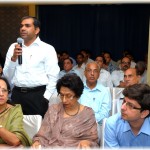Counterfeiting and Smuggling is emerging as the world’s fastest growing industry and represents up to 10 per cent of world trade. Termed as crime of the 21st century, it is affecting almost all economies and sectors. A recent study conducted by Business Action to Stop Counterfeiting and Piracy (BASCAP) indicates the global value of counterfeit and pirated goods, currently estimated at US$650 billion, is likely to double by 2015.
Counterfeiting is increasingly becoming hugely lucrative business, with criminals relying on the continued high demand for cheap goods coupled with low production and distribution costs. The illegal activities related to counterfeiting take advantage of unwitting consumers and bargain-hunters, exploiting people’s appetites for brands or simply their financial situation. The criminal networks behind counterfeiting operate across national borders in activities that include the manufacture, export, import and distribution of illicit goods.
Counterfeiting affect everyone, with Governments, businesses and society being robbed of tax revenue, business income and jobs. The flood of counterfeit and pirated products creates an enormous drain on the global economy by creating an underground trade that deprives Governments of revenue for vital public services and imposes greater burdens on taxpayers. It also leads to more public resources deployment for fraud-detection; and setting up extensive intelligence network and policing budgets to counter sophisticated counterfeiting and smuggling schemes. Counterfeit goods also undermine employment, as products are copied and produced illegally, thereby displacing sales of original merchandise and reducing the turnover of legitimate companies. At present, according to BASCAPs (2009) data on counterfeiting in India reveals that a significant percentage of consumers admitted to purchasing counterfeit or illegal copies of:
- DVDs or CD’s – 63%
- Clothes- 62%
- Software for computers- 37%
- Luxury items e.g. purses, watches, jewellery, leather goods – 52%
- Perfume – 49%
- Toys-56%
- Cosmetics e.g. make-up, lotion – 38%
- Auto parts- 37%
- Food Products or non-alcoholic Beverages- 40%
- Hygiene products e.g. soap, shampoo, toothpaste – 39%
- Small Electronic gadgets e.g. mobile phones, camera- 37%
- Alcoholic Beverages- 26%
- Cigarettes- 25%
- Medicines- 15%
With this view, FICCI Committee against Smuggling and Counterfeiting Activities Destroying the Economy (CASCADE) organized a Seminar on ‘Curbing Counterfeiting and Smuggling—An Imperative for Indian Economy in Lucknow on July 25 2012. This event flags off a nationwide awareness building campaign of FICCI CASCADE to highlight the issues on the growing menace of Counterfeit and Smuggling. [Images above]
The seminar witnessed vigorous interaction with delegates demonstrating an active interest in the issue. Mr. Harsh Chawla from UP Cigarette Retailers Organization highlighted the fact that the magnitude of the problem of counterfeiting in Cigarettes in U.P. is high. The heavy taxation on cigarettes has added to this problem. Cigarettes are sold in the market for Re. 1 while the current tax structure does not allow any legal product to be sold below Rs. 250. The increasing volume of illicit trade encourages entry of organized criminals and leads to generation of huge black money. Issues have been raised in the past by media but manufacturing units are still running and evading huge amount of taxes.
The Seminar also brought forward the fact that the existing enforcement mechanism provide significant recourse for tackling the menace of counterfeiting and smuggling. Some of the key strategies that emerged from the seminar include:
- Traders and Industry should proactively inform the Central Excise Department, Chief Commissioner of Excise and Customs as well as local police
- Public at large and Consumer organization are encouraged to bring their complaint/ issues to the notice of FICCI CASCADE which will help to take it further
- Consumer Rights organisations should play an active part in highlighting the issue and spreading awareness amongst consumers
- Consumer should act forcefully and always demand a bill while making a purchase
- Enforcement agencies should act pro-actively to control this problem
- FICCI CASCADE may initiate National helpline to gather information on cases of illicit trade which can after due checks be put forth to the requisite government department for further action
- Industry to should build in awareness related messages in its promotional campaign
- Study USPTO infrastructure and systems to learn the best practices of enforcement that may inform the future enforcement strategy


